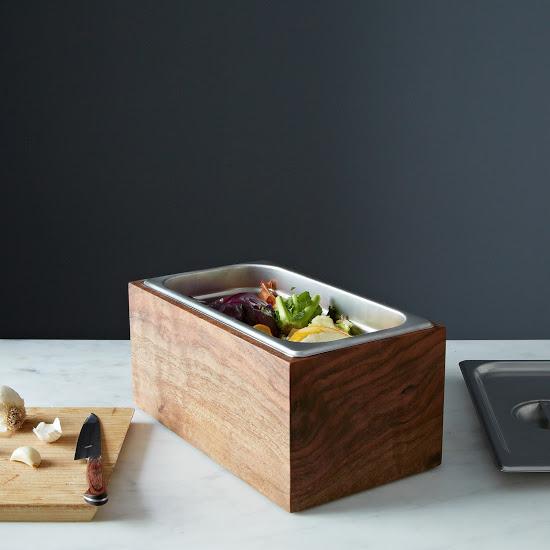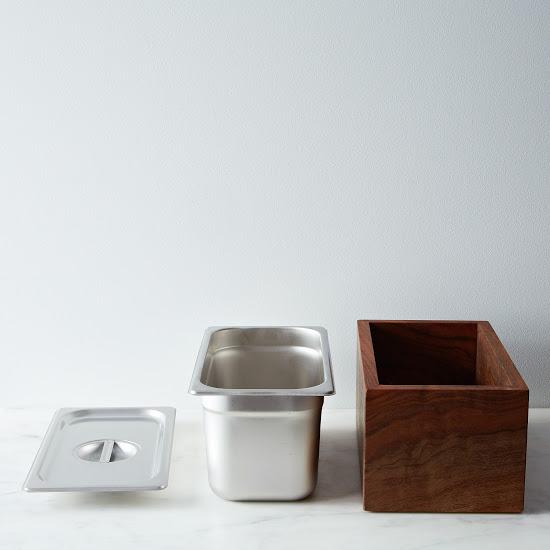Inspired by conversations on theFOOD52 Hotline, we're sharing tips and tricks that make navigating all of our kitchens easier and more fun.
Today: We have plants, soil, and gardening on the mind, so we'rerevisiting this guide on three ways to compost kitchen scraps.

Shop the Story
Composting scares many of us the way that baking bread does: It requires us to follow certain rules, use our best judgement, and leave the rest to science (and perhaps add in a few prayers to the homemaking gods for good measure).
The virtues of composting are clear: It reduces waste and gives valuable nutrients back to soil. But the alternative is often too easy—you chop your onion, peel your banana, and slide all the refuse straight into the trash. Still, composting can easily be integrated into your life, whether you have a vast yard or a closet-sized apartment. Even the laziest of us can do something useful with our organic food waste, and we're here to tell you how.
First, the quick and dirty on composting:
Composting is a natural process in which organic matter breaks down into fertilizer with the help of microorganisms in soil (or, as we'll discuss later, earthworms). This resulting soil—which passionate gardeners often call "black gold" and Martha Stewart sweetly describes as having the texture of "crumbled chocolate cake"—is rich in nutrients and will help retain moisture when added to your garden beds or potted plants. Fun fact: The scientific name for that "black gold" ishumus.
The right materials:
There are a few things to avoid adding to your compost bin or pile. These include the thick rinds of citrus, fats or lard, ash, pet waste, and dairy. A comprehensive list of what's cool to compost and what isn't can be found here.

Once you have the right scraps, your options for composting can be organized in three categories:
Aerobic composting:
At its most basic, aerobic composting requires only carbon, nitrogen, air, and water. The nitrogen comes from "green" materials such as food scraps, grass, and garden trimmings, while the carbon comes from "brown" materials such as fall leaves, straw, and shredded paper. Keeping these different factors balanced is important—a reliable ratio is two parts green to one part brown, added in alternating layers to create a compost pile.
If you're lucky enough to have a yard, you can easily keep an aerobic compost pile. There are a number of ways to do it, but they all require a few basic tools and practices. Find a dry, shady spot, collect and add your food scraps, and add water, turning occasionally for proper aeration. Cover with a tarp if you live in an especially hot or rainy area. Celebrate your resultinghumus (maybe by eating some hummus?), and add it to your garden. For more comprehensive instructions, turn to the EPA's composting website.
If you don't have a yard, but you're still committed to aerobic composting at home, there's hope for you yet—you just need to enlist the help of some industrious worms. Vermicomposting is becoming increasingly popular in urban areas. If you're interested, take a look at this handy how-to graphic.
Anaerobic composting:
Also known as Bokashi composting, anaerobic composting doesn't require oxygen, water, or even walking outside. With an aerobic composting system—we like the Noaway Countertop Walnut Compost Bin—you simply add your kitchen scraps to a container, drain off excess liquid as your scraps decompose, and wait a few weeks for nutrient-rich fertilizer. These bins are a discreet, smell-free way to compost in the comfort of your kitchen—and they're crafted with gorgeous salvaged walnut, perfect for sprucing up any kitchen counter.
Outsourcing:
If you don't have any use for fertilizer, or you know that composting just isn't going to happen for you right now, you still don't have to throw away your banana peels and egg shells. Your local farmers will be delighted to take organic food scraps off of your hands—and you'll be contributing to the bounty you'll be buying from them next season. Many cities have drop-off programs for compostable material. Search for one in your area, or simply offer up your scraps to the man selling you that rutabaga. You'll probably make his day.
Tell us: Do you compost? What sort of system do you use?

